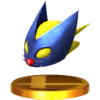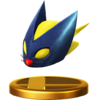| Don't like the ads? Then create an account! Users with accounts have more options than anonymous users. |
Bombchu
| This article was originally written on Zeldapedia, whose content is licensed under the compatible CC-BY-SA license. | View this template |
| Bombchu | |||
|---|---|---|---|
 Artwork from The Legend of Zelda: Ocarina of Time | |||
| First appearance | The Legend of Zelda: Ocarina of Time (1998) | ||
| Latest appearance | Cadence of Hyrule: Crypt of the NecroDancer featuring The Legend of Zelda (2019) | ||
| Location(s) | Varies | ||
| Effect | An explosive that quickly moves along a set path before exploding | ||
| |||
- Not to be confused with Real Bombchu.
Bombchus (alternatively pluralized as Bombchu) are explosive items resembling blue and yellow mice. They first appear in The Legend of Zelda: Ocarina of Time. When released, a Bombchu dashes along a surface, including walls, until its fuse is gone or until it hits a solid object; in either case, the Bombchu explodes. Bombchus can be used to hit certain far-off targets, and using them is usually not required.
History[edit]
The Legend of Zelda series[edit]
The Legend of Zelda: Ocarina of Time[edit]
In The Legend of Zelda: Ocarina of Time, Bombchus can be obtained only after Link has obtained a Bomb Bag. They can be purchased from the Bombchu Shop in the Back Alley of Hyrule Castle Town, from the Carpet Merchant in the Haunted Wasteland, found in chests scattered throughout Hyrule, and won as prizes from the Bombchu Bowling Alley. Additionally, Bombchu serve as Link's reward from the Cursed Family for collecting 40 Gold Skulltula Tokens.
Link can carry up to 50 Bombchus, and no upgrades are available. Unlike other items with expendable ammunition, they cannot be found in pots or other breakable objects, nor will they be dropped by defeated enemies. A mini-game with a focus on Bombchu known as the Bombchu Bowling Alley can also be found in Hyrule Castle Town.
They are the more obvious solution to a puzzle in the Spirit Temple, and necessary for solving a puzzle Inside Ganon's Castle. Like regular bombs, Dodongos and Baby Dodongos can be killed by feeding them one.
The Legend of Zelda: Majora's Mask[edit]
In The Legend of Zelda: Majora's Mask Link can purchase or find Bombchu when he has purchased a Bomb Bag. Bombchu are completely optional, and are not needed in order to complete the game. They are however, needed to complete the optional Hylian Moon Dungeon and acquire the Piece of Heart within. Bombchu are also used in one of the mini-games in Honey & Darling's Shop. There are also enemies known as Real Bombchu that appear throughout Termina; these enemies retroactively serve as the inspiration for the design and function of Bombchu.
The Legend of Zelda: Oracle of Seasons / Oracle of Ages[edit]
In the Linked Game for either The Legend of Zelda: Oracle of Seasons and The Legend of Zelda: Oracle of Ages, Bombchus can be obtained as items, although their use is entirely optional. The Bombchu in these games are unique, as it can lock on to an enemy and follow it when Link places it. They also have a small fuse on their backs similar to a tail.
In The Legend of Zelda: Oracle of Seasons's Linked Game, a young boy who is Guru-Guru's sole audience member, tells Link the Troy Secret after Link completes Poison Moth's Lair. He instructs Link to tell the secret to Dr. Troy, who can be found in the present, running the Target Carts mini-game in Rolling Ridge in the Oracle of Ages game in which the saga began. After successfully completing a game of Target Carts, Link is given Bombchu.
In The Legend of Zelda: Oracle of Ages's Linked Game, Link will meet a Subrosian in a cave in northeastern Rolling Ridge after completing the Crown Dungeon. The Subrosian tells Link the Subrosian Secret, which he must take to a golden Subrosian found in a cave in Subrosia in the Oracle of Seasons game in which the saga began. After a quick mini-game, in which Link must use the Magical Boomerang three or less times to clear a patch of grass, Link obtains Bombchu.
The Legend of Zelda: The Wind Waker[edit]
In The Legend of Zelda: The Wind Waker, Bombchus are reimagined as an organic enemy Rat, potentially based off the Real Bombchu. They are a gray and red recolor of normal Rats, and like them can crawl up walls and ceilings and hide in mouse holes. They spawn carrying bombs, which they throw at Link, and can get new ones after going into mouseholes. When defeated, they usually give usable bombs or a red Rupee. They are very rare, only appearing in one submarine and during the second visit to the Forsaken Fortress. They share their figurine with Rats.
The Legend of Zelda: Four Swords Adventures[edit]

In The Legend of Zelda: Four Swords Adventures, Bombchus appear as rare enemies again, albeit closer to their usual portrayal. They spawn endlessly from holes, and in top-down areas bounce around walls chaotically before exploding, and in side-scrolling areas run along the floor, walls, and ceiling before exploding.
The Legend of Zelda: Phantom Hourglass[edit]
In The Legend of Zelda: Phantom Hourglass, Bombchus are items again, being obtained in the Goron Temple and are sold on Goron Island. They are carried in Bombchu Bags, for which upgrades are available. The path of Bombchus can be drawn using the Stylus on the Touch Screen Nintendo DS. Bombchus have great range, and can pass through small holes in walls, allowing Link to hit switches that are otherwise impossible to hit. Bombchus are useful for looking around corners without any danger to Link, therefore not being surprised by enemies. Bombchus can be found in bundles of three in Item Bulbs.
Hyrule Warriors[edit]
In Hyrule Warriors and its reissues, Bombchus appear in several scenarios. Although they are not usable items, Bombchus are very large and have a set course they travel on. Their first appearance is in The Sheikah Tribesman, where Link and Impa must escort several to locations where they will blow up obstacles in the heroes' path. They also appear in the Land of Myth story scenario, in which Darunia releases several Bombchus to demolish the allied base. Impa and Sheik must then either destroy the Bombchus or defeat the Goron Bombchu Operators to commandeer the Bombchu for the Hyrulean Forces and use them to attack the Goron Forces' bases. Their final appearance is in Liberation of the Triforce, in which the Hyrulean army uses one to blow their way through a bordering wall of one of the Field Keeps. They also make multiple appearances in Adventure Mode. They are one of the enemies that can spawn to attack a Cucco Chick, and "attack" by following incessantly to plow into it.
Super Smash Bros. series[edit]
Since Super Smash Bros. for Nintendo 3DS, Bombchus appear as items in the Super Smash Bros. games. Once a player activates a Bombchu by throwing it, it continues moving in one direction in a non-stop path, going over obstacles, walls and even ceilings or under the stage. Once a player touches the traveling Bombchu, it explodes on impact, damaging the player. Bombchus can be destroyed by lava and other attacks.
Super Smash Bros. for Nintendo 3DS / Wii U trophy information[edit]
Blue indicates exclusive to the Wii U version.
Gallery[edit]
-
The Legend of Zelda: Ocarina of Time sprite
-
The Legend of Zelda: Oracle of Seasons / Oracle of Ages sprite
-
Super Smash Bros. for Wii U screenshot
-
Super Smash Bros. Ultimate artwork
Names in other languages[edit]
| Language | Name | Meaning |
|---|---|---|
| Japanese | ボムチュウ Bomuchū |
From "bomb" and「チュー」(chū, onomatopoeia for a mouse's squeaking) |
| Spanish | Bombuchu | - |
| French | Rat Teigneux | Nasty Rat |
| German | Krabbelmine Krabbelratte (The Wind Waker) |
|
| Italian | Topo Bomber | Bomber Mouse |
| Russian | Бомбышь Bombysh' |
From бомба (bomb) and мышь (mouse). |
| Chinese | 炸彈鼠 (Traditional) 炸弹鼠 (Simplified) Zhàdàn shǔ |
Bomb Mouse |
- Explosives
- Rodents
- The Legend of Zelda: Ocarina of Time items
- The Legend of Zelda: Majora's Mask items
- The Legend of Zelda: Oracle of Ages items
- The Legend of Zelda: Oracle of Seasons items
- The Legend of Zelda: The Wind Waker enemies
- The Legend of Zelda: Four Swords Adventures enemies
- The Legend of Zelda: Phantom Hourglass items
- Hyrule Warriors objects
- Super Smash Bros. series items
- Super Smash Bros. for Nintendo 3DS trophies
- Super Smash Bros. for Wii U trophies



